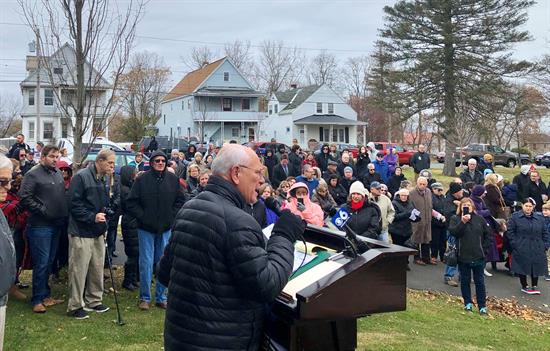- Home
- About
-
Constituent Services
- Academy Nominations
- Community Project Funding
- Congressional Art Competition
- Congressional App Challenge
- Congressional Commendation
- Event Invitation
- Grants
- Help with a Federal Agency
- Internships
- IRA Clean Energy Consumer Benefits
- Know Your Rights: Immigration
- Request a Meeting
- Request Surplus Books
- Presidential Greeting
- Visit Washington D.C.
- Issues & Legislation
- News
- 20th District
- Contact

Press Releases
Tonko, Fitzpatrick, Markey Introduce Bipartisan Bill to Bolster Resilience & Mental Wellness for CommunitiesCommunity Mental Wellness & Resilience Act tackles mental health crisis further exacerbated by natural disasters
Washington,
May 4, 2023
WASHINGTON, DC—During Mental Health Awareness Month, Representatives Paul D. Tonko (D-NY) and Brian Fitzpatrick (R-PA), and Senator Edward Markey (D-MA) announced the introduction of their Community Mental Wellness & Resilience Act, a bipartisan bill that will tackle the nation’s mental health crisis head-on by addressing the extensive community trauma caused by natural disasters. This innovative legislation will empower communities through a new federal grant program to craft their own locally specific responses to the mental health problems caused by disasters and toxic stresses. Representatives Don Bacon (R-NE), Kathy Castor (D-FL), and Mary Peltola (D-AK) are sponsors of the legislation. “The increasing number and severity of natural disasters and toxic stresses cost our communities dearly, taking lives and livelihoods—and the trauma felt from these disasters runs even further,” Rep. Tonko said. “Studies show that these impactful events can traumatize upwards of 40 percent of those who live in the affected area. That’s why I’m partnering with my colleagues to lead the way on this resilience building legislation that will help address our nation’s mental health crisis through grants and partnerships with local, community-based initiatives. I’ll continue to work to deliver science-based, evidence-informed solutions that benefit communities across our nation and offer a holistic response to the climate crisis.” “In 2022, more than 3 million Americans were impacted by a natural disaster,” said Congressman Fitzpatrick. “I am proud to introduce this bipartisan legislation that expands our nation’s mental health resources at the local level with community-based initiatives, ensuring that victims of natural disasters have access to critical mental health care.” “Environmental justice communities are bearing the brunt of compounded climate and mental health crises fueled by climate disasters that level homes, break apart communities, and leave people with visible and invisible scars,” said Senator Markey. “The Community Mental Wellness and Resilience Act is central to our vision for a Green New Deal future that addresses not only the health of our planet but the health of our people. This legislation will give communities the resources they need to build defenses to these dual crises and ensure a healthier, more sustainable future for all.” In addition to the studies showing that nearly 50 million American adults suffered from a diagnosed mental illness last year, a 2022 Centers for Disease Control and Prevention (CDC) survey found that more than a third of American high school students reported poor mental health, including stress, anxiety, and depression. Natural disasters only exacerbate the problem. Consequently, the number of people who experience a mental health problem as a result of a natural disaster often outweigh those with physical injuries by 40 to 1. The Community Mental Wellness & Resilience Act addresses this growing problem by:
More than 130 organizations support Rep. Tonko’s legislation, including the following national groups: American Lung Association; American Public Health Association; American Psychiatric Association; American Psychological Association, ecoAmerica; Campaign for Trauma-Informed Policy and Practice; Climate Psychiatry Alliance; International Transformational Resilience Coalition (ITRC); Mental Health America; The National Association of Social Workers (NASW); National Association of State Mental Health Program Directors; National Council for Mental Wellbeing, National Rural Health Association, Rural Opportunity Institute. A full list of supporting organizations and their quotes can be found HERE. A fact sheet on the legislation can be found HERE. |
